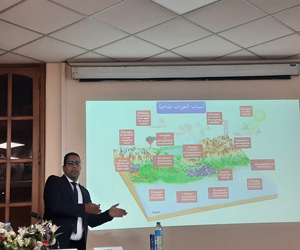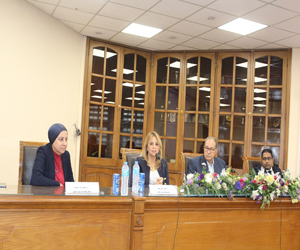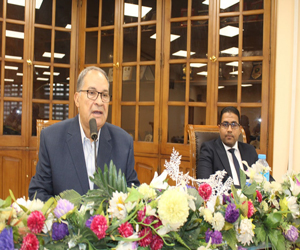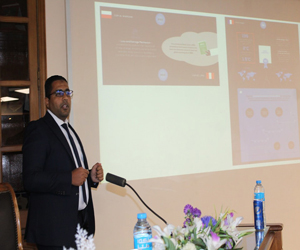The Faculty of Arts opens the cultural season for the new year with a symposium on climate change and the carbon footprint
Under the auspices of Prof. Dr. Mahmoud El-Meteini, President of Ain Shams University, Prof. Dr. Mohamed Ayman Saleh, Vice President for Graduate Studies and Research, Prof. Dr. Hanan Kamel, Acting Dean of the Faculty of Arts, and supervised by Prof. Dr. Shereen Mazloum, Vice Dean for Graduate Studies and Research Affairs, launched the first activities of the college's cultural season for the academic year 2022/2023 with a symposium on climate change and the carbon footprint... Causes and solutions in light of the World Climate Summit Cop 27
Prof. Dr. Hanan Kamel thanked Prof. Dr. Shereen Mazloum for her efforts to enrich the cultural aspect of the college by setting up a program of cultural season activities, which is characterized by the participation of all departments of the college with new and exclusive ideas and topics in order to support and advance the general culture and keep pace with events, which achieves a distinct kind of commendable competition Between the various departments and sectors in a way that benefits all members of the college and emphasizes the college's ability to give, continuity and participation through its scholars and distinguished professors in building the new republic.
 |
 |
She stressed that the selection of the topic of the lecture coincides with the preparation for the World Climate Summit, Cop27, to be hosted in Sharm El-Sheikh next month, and within the efforts of the various state institutions within the framework of the presidential initiative "Be Prepared for Green" in the framework of sustainable development and Egypt's Vision 2030.
On his part, Prof. Dr. Abdul Aziz Abdul Latif, Professor of Climate Geography in the Department of Geography and Geographic Information Systems at the college, said that the department has produced many research and scientific messages on climate and climate changes, as it provides all research capabilities to advance the science of climate geography.
Prof. Dr. Abdul Latif, confirmed that according to a previous scientific study that plastic and polyester constitute 10% of the causes of climate change, explaining the need to reduce its use as a self-awareness of individuals to participate in reducing heat emissions.
He also pointed out that cities contribute greatly to the problem and are considered the carbon focus in countries, and he likened it to the purulent focus in the human body, which can negatively affect the rest of the body.
While Dr. Khaled Madkour, a lecturer of climatic geography in the department, began reviewing his scientific material on the presentation program by clarifying the term climate change, and explaining the manifestations and causes of climate change, ancient and modern, represented by (volcanic eruptions, sunspots, industrial sources, burning fossil fuels, in addition to increasing energy use, He also explained the international efforts within the framework of global agreements to reduce thermal emissions, Egypt's efforts to reduce thermal emissions, despite it being a very small contribution to global thermal emissions.
 |
 |
He pointed out that at the top of these efforts, in September 2020, Egypt issued a sovereign green bond worth $750 million, the first of its kind in the Middle East and North Africa, as well as the “Be prepared for green” initiative.
He called for the need to reduce each person's carbon footprint by reducing the use of bicycles instead of cars and riding mass transportation instead of cars whenever possible.
He also applied the percentage of the carbon footprint on the attendees through a questionnaire containing a number of questions about the attendance's energy use.
Prof. Dr. Hanan Kamel presented certificates of appreciation to Prof. Dr. Abdel Aziz Abdel Latif and Dr. Khaled Madkour for their efforts in raising awareness about this issue.


.svg)




